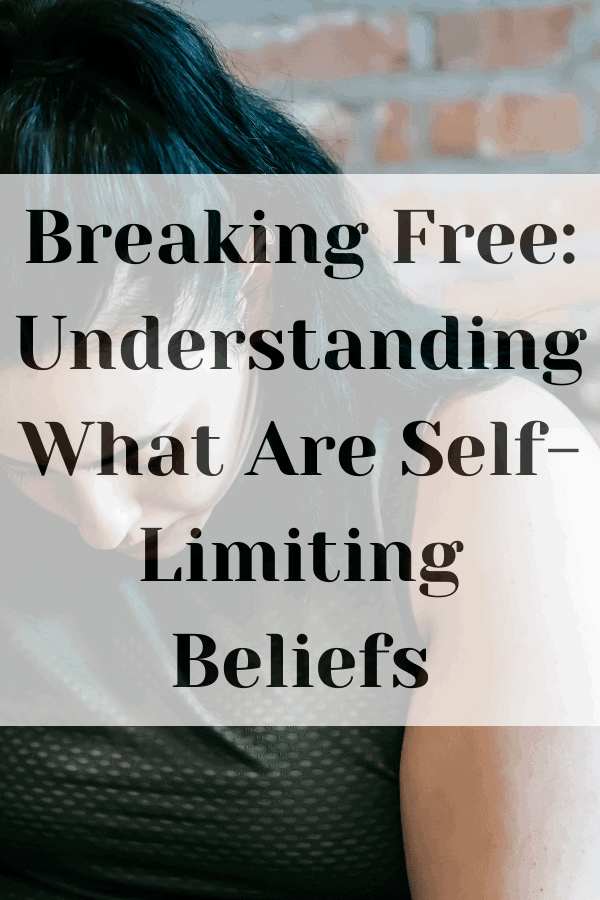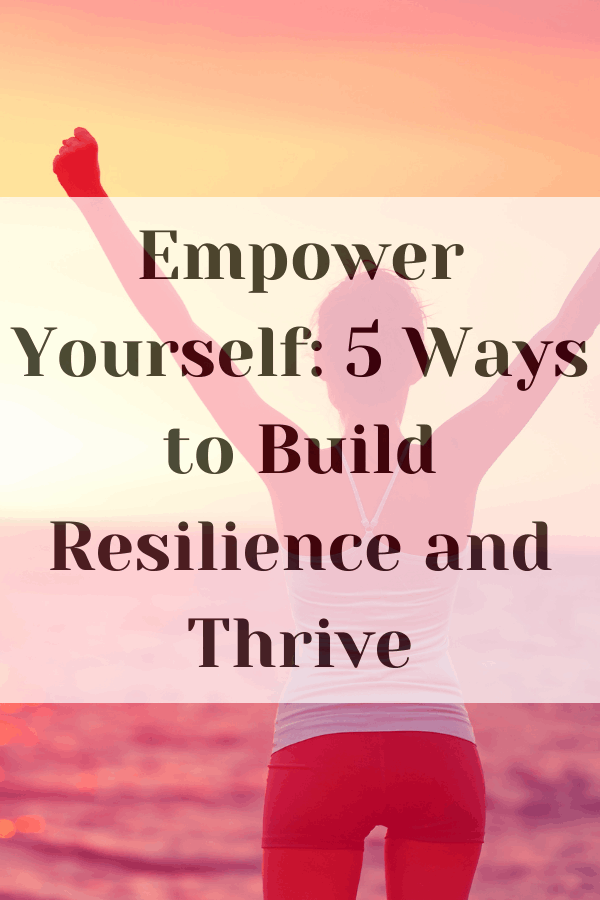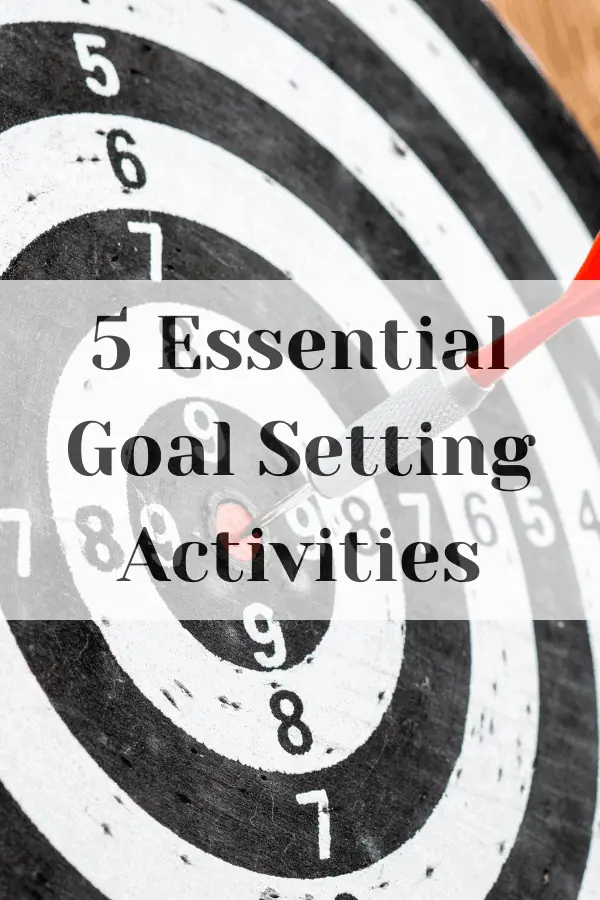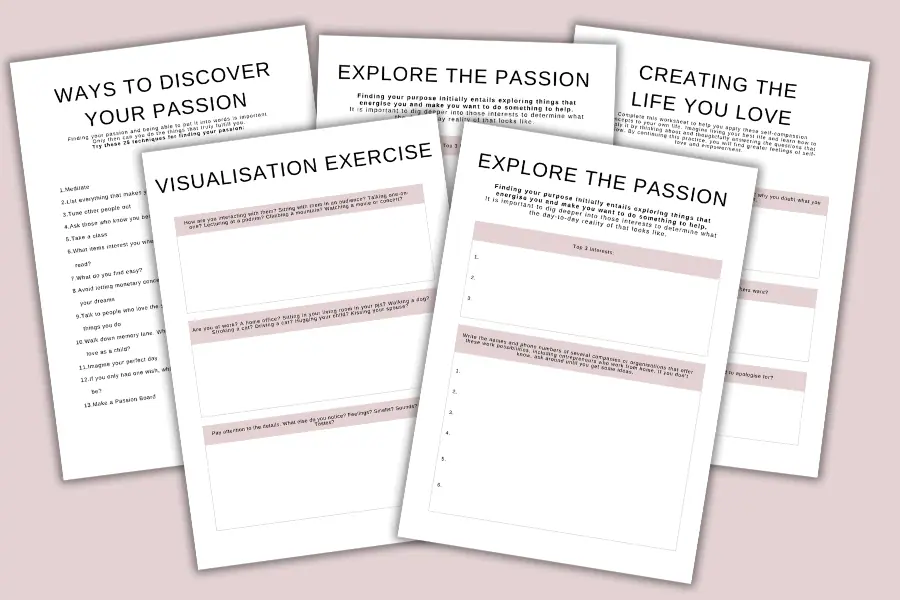Breaking Free: What Are Self-Limiting Beliefs

When we talk about self-limiting beliefs, we’re referring to the subconscious thoughts and convictions that hold us back from reaching our full potential. These beliefs are like mental barriers we create within ourselves, often without realising it.
We all have those little voices in our heads that make us believe we are not good enough. But this simply isn’t true! In this blog, we will explore what are self-limiting beliefs and how we can overcome them.
This blog post is about what are self-limiting beliefs

Origins of Self-Limiting Beliefs
The tricky thing about self-limiting beliefs is that they often operate in the background, subtly influencing our decisions, behaviours, and aspirations. They can manifest in different aspects of life, such as relationships, careers, personal development, and more.
Here are a few examples of where your self-limiting beliefs can steam from:
Childhood experiences
Many self-limiting beliefs find their roots in our early years. This is a time when we’re like sponges, absorbing information and forming our understanding of the world. If, for instance, we received criticism or were repeatedly told we couldn’t do something, these messages can embed themselves in our psyche. These early experiences shape our self-perception, and unfortunately, negative beliefs can stick around long into adulthood.
Societal influences
Society, with its expectations, norms, and sometimes limiting stereotypes, can be a powerful source of self-limiting beliefs. We might absorb messages from media, culture, or even well-meaning but misguided advice from people around us. For example, if society sends the message that certain achievements are only for specific groups, we might internalise the belief that we don’t belong in those spaces.
Past failures
Previous setbacks or failures can be a breeding ground for self-limiting beliefs. If we’ve faced challenges or experienced failures in the past, we may start to doubt our abilities. We might convince ourselves that because we failed before, we’re destined to fail again.
Comparison with others
Constantly comparing ourselves to others, especially when it comes to achievements or talents, can lead to self-limiting beliefs. If we perceive others as more successful or talented, we might start to believe that we’re inherently less capable.
Lack of positive reinforcement
Conversely, a lack of positive reinforcement can also contribute to self-limiting beliefs. If we rarely receive praise or encouragement, we might start to doubt our worth and abilities.
It’s important to remember that understanding the origins of these beliefs is not about assigning blame, but about gaining insight. Recognising where these beliefs come from empowers us to challenge and reshape them.
Common Types of Self-Limiting Beliefs
Let’s take a closer look at some common types of self-limiting beliefs that many people grapple with:
“I’m not good enough”
This belief is pervasive and can manifest in various forms. It might show up as thinking you’re not smart enough, not talented enough, not attractive enough, or not worthy of love or success. For example, someone might believe they’re not smart enough to pursue a certain career, even if they have the skills and potential.
“I’m a failure”
This belief often stems from past experiences of not meeting our own or others’ expectations. It can lead to a fear of trying new things or taking risks, for fear of failing again. For instance, someone might avoid applying for a job they’re qualified for because they’re convinced they’ll be rejected.
“I don’t deserve happiness/success”
This belief is rooted in feelings of unworthiness. It can lead to self-sabotage or settling for less than what you truly desire. For instance, someone might avoid pursuing a fulfilling relationship because they believe they don’t deserve to be loved.
“I’m too old/young”
Age-related self-limiting beliefs can hold people back from pursuing new opportunities or making significant life changes. For instance, someone might believe they’re too old to start a new career, or too young to be taken seriously in their field.
“I must always please others”
This belief centres around the idea that your worth is determined by how much you do for others, often at the expense of your own needs and desires. This can lead to burnout and a lack of fulfilment in your own life.
“I shouldn’t take risks”
Fear of taking risks can stem from a belief that failure is unacceptable or that playing it safe is the only way to succeed. This can lead to missed opportunities for growth and innovation.
“I’m stuck in my ways”
This belief can lead to resistance to change or trying new things. It might make someone believe that they’re incapable of learning or adapting, even when evidence suggests otherwise.
These are just a few examples, but it’s important to note that self-limiting beliefs can take many forms and vary from person to person. They’re personal to each individual and often tied to their unique life experiences. Recognising these beliefs is the first step toward challenging and ultimately overcoming them. In the following sections, we’ll explore practical strategies to do just that.
Impact on Personal Growth
Let’s delve into how self-limiting beliefs can significantly impact personal growth, goal achievement, and overall well-being.
Hindrance to personal development
Self-limiting beliefs act like roadblocks on the path of personal development. They create a mental barrier that limits one’s willingness to step out of their comfort zone and explore new opportunities. For example, if someone believes they’re not naturally talented in a certain area, they might avoid trying to develop those skills, missing out on potential growth.
Undermining goal achievement
These beliefs have a powerful influence on goal-setting and attainment. If someone believes they’re not capable of achieving a particular goal, they’re less likely to even attempt it. This can lead to missed opportunities and a sense of unfulfilled potential. For instance, someone with the belief that they’re not good with numbers might shy away from pursuing a career in finance, even if they have a genuine interest.
Reduced confidence and self-esteem
Self-limiting beliefs erode confidence and self-esteem. When you constantly tell yourself that you’re not good enough or capable enough, it takes a toll on your self-worth. This can affect how you present yourself to the world, impacting relationships, career progression, and overall well-being.
Negative impact on mental health
These beliefs can contribute to stress, anxiety, and even depression. The constant self-doubt and negative self-talk can create a toxic cycle that affects mental health. For example, someone who believes they’re always destined to fail might experience chronic stress and anxiety related to their pursuits.
Limiting choices and opportunities
Self-limiting beliefs can narrow your perspective and limit the choices you make in life. For instance, if someone believes they’re not outgoing enough to network and make valuable connections, they might miss out on career opportunities that could have been transformative.
Stagnation in personal and professional life
Ultimately, self-limiting beliefs can lead to a sense of stagnation. You may find yourself stuck in a routine, unwilling to take risks or explore new paths. This can lead to a feeling of unfulfilled potential and a lack of progress in both personal and professional spheres.
It’s crucial to recognise the profound impact these beliefs can have on your life. By understanding them and learning how to challenge and overcome them, you open the door to a world of possibilities and personal growth. In the next sections, we’ll explore practical steps to identify and address self-limiting beliefs, enabling you to unlock your true potential. Remember, you have the power to reshape your beliefs and achieve the things you truly desire.
Identifying Self-Limiting Beliefs
Recognising and identifying self-limiting beliefs is a crucial step in overcoming them. Here are some tips to help you become more aware of your own self-limiting beliefs:
Practice mindfulness and self-reflection:
Take time to pause and reflect on your thoughts and feelings. Mindfulness techniques, like meditation or journaling, can help you become more aware of the thoughts that might be holding you back.
Pay attention to negative self-talk:
Listen to the language you use when talking to yourself. Are you frequently using phrases like “I can’t,” “I’m not good enough,” or “I’ll never be able to”? These are often indicators of self-limiting beliefs.
Observe patterns of avoidance or procrastination:
Notice if there are certain tasks or situations that you consistently avoid. This could be a sign that there’s an underlying belief causing you to shy away from those experiences.
Seek feedback from trusted sources:
Sometimes, others can see our potential more clearly than we can. Ask trusted friends, family members, or mentors for their perspectives on your strengths and abilities. Their insights might reveal areas where you’re underestimating yourself.
Challenge assumptions and generalisations:
When you catch yourself making sweeping statements like “I’m always bad at this” or “I’ll never be able to do that,” pause and ask yourself if these statements are based on actual evidence or if they’re assumptions.
Consider the source of your beliefs:
Reflect on where these beliefs might have originated. Were they influenced by family members, teachers, past experiences, or societal expectations? Understanding the source can provide insight into why you hold these beliefs.
Journaling for clarity:
Write down your thoughts and feelings, especially when you’re facing challenges or feeling stuck. This can help you uncover underlying beliefs and patterns that may be affecting your decisions and actions.
Monitor emotional reactions:
Pay attention to how certain situations or thoughts make you feel. Strong negative emotions, like fear, anxiety, or frustration, can be signals that a self-limiting belief is at play.
Consider alternative perspectives:
Encourage yourself to think about situations from different angles. What would happen if you approached things with a more positive or empowered mindset?
Remember, the goal here is not to judge yourself, but to understand yourself better. Recognising these beliefs is the first step toward challenging and ultimately overcoming them. In the following sections, we’ll explore practical strategies to address and replace self-limiting beliefs, empowering you to realise your full potential. You have the power to reshape your beliefs and achieve the things you truly desire.
Challenging and Overcoming Self-Limiting Beliefs
Let’s explore some effective strategies and techniques for challenging and overcoming self-limiting beliefs:
Self-reflection and awareness
Continuously observe your thoughts and beliefs. When you identify a self-limiting belief, pause and ask yourself if it’s based on facts or assumptions. This awareness is the first step to change.
Reframe negative thoughts
Replace negative self-talk with positive, empowering statements. For example, if you catch yourself thinking, “I can’t do this,” reframe it to, “I may face challenges, but I’m capable of finding solutions.”
Gather evidence of your abilities
Keep a record of your achievements, both big and small. This tangible evidence serves as a reminder of your capabilities and can counteract self-doubt.
Set realistic goals and celebrate achievements
Break down larger goals into smaller, manageable tasks. Celebrate each step you accomplish. This reinforces a positive self-image and counters feelings of inadequacy.
Challenge perfectionism
Accept that perfection is not attainable. Embrace the learning process and allow room for mistakes. Understand that mistakes are opportunities for growth.
Visualise success
Use visualisation techniques to imagine yourself succeeding in your endeavours. This mental rehearsal can boost confidence and reduce the power of self-limiting beliefs.
Seek external validation
Don’t hesitate to seek feedback and validation from trusted sources. Others’ perspectives can offer valuable insights into your strengths and abilities.
Practice self-compassion
Treat yourself with the same kindness and understanding that you would offer to a friend facing a similar challenge. Replace self-criticism with self-compassion.
Challenge assumptions and catastrophising
When you catch yourself assuming the worst-case scenario, take a step back. Ask yourself for evidence to support or challenge these assumptions.
Embrace growth mindset
Adopt the belief that abilities and intelligence can be developed through dedication and hard work. Embrace challenges as opportunities for growth.
Surround yourself with positivity
Seek out environments, people, and resources that uplift and inspire you. Positive influences can help counteract the impact of self-limiting beliefs.
Seek professional support if needed
If self-limiting beliefs significantly impact your well-being or progress, consider speaking with a therapist or counsellor. They can provide tailored strategies and support.
Remember, challenging and overcoming self-limiting beliefs is a journey. Be patient and compassionate with yourself. By consistently applying these techniques, you’ll gradually rewire your thought patterns and unlock your true potential.
Taking Action
Here are some actionable steps and practical exercises that you can implement to work on identifying and overcoming your self-limiting beliefs:
Create a belief journal
Start a journal specifically dedicated to tracking your thoughts and beliefs. Whenever you notice a self-limiting belief, write it down along with the situation that triggered it. This helps in recognising patterns.
The “Why” exercise
When you identify a self-limiting belief, ask yourself why you believe it. Then ask “why” again to dig deeper. For example, if you believe “I’m not good enough,” ask why. Keep asking until you uncover the underlying belief.
Challenge negative statements
Whenever you catch yourself thinking a self-limiting thought, challenge it. Ask for evidence that supports or contradicts the belief. This can help in reframing your perspective.
Create affirmations
Develop positive affirmations that counteract your specific self-limiting beliefs. For instance, if you believe “I’m not talented,” create an affirmation like “I have unique strengths and abilities.”
Visualise success scenarios
Practice visualisation techniques where you imagine yourself succeeding in situations where you usually face self-doubt. Engage your senses to make the visualisation as vivid as possible.
Engage in self-compassion exercises
Treat yourself with the same kindness you’d offer to a friend. Practice self-compassion exercises, such as writing a supportive letter to yourself or engaging in self-soothing techniques.
Set realistic goals and track progress
Break down your larger goals into smaller, achievable tasks. Celebrate each step you complete. Tracking your progress provides tangible evidence of your capabilities.
Use “Even If” statements
Challenge your self-limiting beliefs by using “even if” statements. For example, “Even if I’m nervous, I can still give a great presentation.”
Surround yourself with positivity
Spend time with people who uplift and support you. Engage in activities that boost your confidence and self-esteem. Create a positive environment that reinforces your worth.
Practice mindfulness and self-compassion
Engage in mindfulness exercises that help you stay present and aware of your thoughts without judgment. Combine this with self-compassion practices to foster a nurturing inner dialogue.
Seek feedback and validation
Reach out to trusted friends, family members, or mentors for their perspectives on your strengths and abilities. Their feedback can provide valuable insights.
Celebrate achievements, big or small
Acknowledge and celebrate your successes, no matter how small. This reinforces a positive self-image and counters feelings of inadequacy.
Remember, consistency is key. Practice these exercises regularly to gradually shift your thought patterns and replace self-limiting beliefs with empowering ones. It’s a journey, so be patient and kind to yourself along the way. In doing so, you’ll unlock your true potential and pave the way for a more fulfilling and empowered life.
Key Takeaways
Let’s summarise what we’ve learnt so far:
Self-limiting beliefs
These are subconscious thoughts and convictions that hold us back from realising our full potential. They often stem from childhood experiences, societal influences, past failures, and more.
Recognising and identifying these beliefs
This is the first step towards overcoming them. It involves practising mindfulness, paying attention to negative self-talk, seeking feedback, and challenging assumptions.
The impact
These beliefs can have a significant impact on personal growth, goal achievement, and overall well-being. They can hinder development, undermine confidence, and limit opportunities.
How to overcome
Challenging and overcoming self-limiting beliefs involves reframing negative thoughts, setting realistic goals, seeking external validation, and practising self-compassion.
Practical exercises and action steps
These include creating a belief journal, using the “Why” exercise, visualising success, and surrounding oneself with positivity.
Embarking on the journey to overcome self-limiting beliefs is a courageous step towards unlocking your true potential. Remember, change takes time and patience. As you implement these strategies and exercises, be gentle with yourself. Celebrate your progress, no matter how small, and acknowledge the strength it takes to challenge long-held beliefs.
Believe in your own capacity for growth and transformation. Know that you have the power to shape your beliefs and create the life you truly desire. Embrace each day as an opportunity to challenge and rewrite your narrative.
This blog post was about what are self limiting beliefs
Share this post: on Twitter on Facebook






